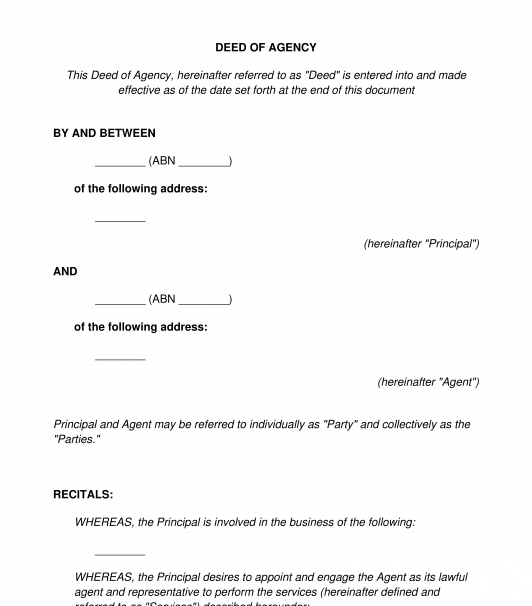 25/01/2025
25/01/2025

Answer a few questions and your document is created automatically.

Your document is ready! You will receive it in Word and PDF formats. You will be able to modify it.

 25/01/2025
25/01/2025
 Word and PDF
Word and PDF
 13 to 19 pages
13 to 19 pages



An Agency Agreement, also sometimes called an Agent Agreement, is a document between two parties, a principal, and an agent. With this agreement, the principal gives the agent the authority or capacity to do certain things on behalf of the principal. In many cases the agent is given the authority to create or affect legal relations between the principal and third parties. However in some other cases, this involves the agent simply being authorised to make representations on behalf of the principal.
Within this Agency Agreement, the principal and agent outline their expectations for the agency. They clarify the terms between the agent and principal, including the rights and obligations of each party.
An Agency Agreement is different from an Employment Agreement. The relationship between a principal and an agent is different from that between an employer and an employee. It is important that when parties are creating the agency relationship, they do not create an employment relationship. In an employment relationship, the employer has additional obligations including such things as workers' compensation, superannuation, annual leave, sick leave and long service leave.
In order to avoid creating an employment relationship, the parties may wish to consider the following:
If in doubt, seek legal advice.
How to use this document
Enter the relevant information in the form when prompted including information about the parties, about the nature of the agency relationship, and about any fees that the principal might be paying to the agent.
In an Agency Agreement, the parties will be able to provide various details of the parties' relationship, including such things as a description of the services that the agent will be performing, as well as the general business of the principal, and how the principal is expected to pay. This Agency Agreement can also deal with dispute resolution and governing law.
After inputting the required information, print the Agreement and have it signed by both parties. The parties can both keep a copy on file for their own records.
Applicable law
The general principles of agency in Australia arise out of the common law. Common law principles of contract law may also apply.
In addition, many forms of agency are also affected by specific legislation in Australia. For example, real estate agents, auctioneers, tax agents, finance brokers, travel agents, mercantile agents, insurance agents, and various other agents, may all be affected by industry specific legislation at the state or commonwealth level.
In addition, in some cases the Australian Consumer Law which is set out in the Competition and Consumer Act 2010 (Commonwealth), may also apply.
If in doubt, seek legal advice.
How to modify the template
You fill out a form. The document is created before your eyes as you respond to the questions.
At the end, you receive it in Word and PDF formats. You can modify it and reuse it.
A guide to help you: What to do after Preparing a Contract
Agent Agreement - sample template online - Word and PDF
Country: Australia